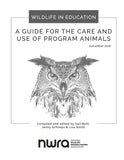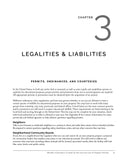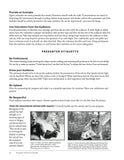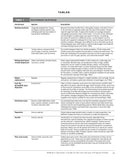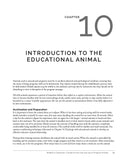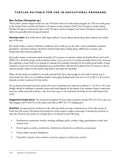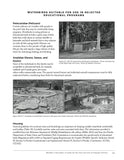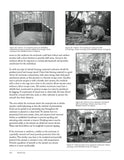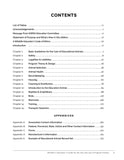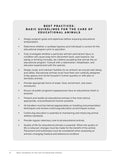Wildlife In Education: A Guide for the Care and Use of Program Animals, 2nd Ed
Eligible for 20% member discount. Must use code at checkout to receive discount.
Table of Contents
-
List of Tables
-
Acknowledgements
-
Message From NWRA Education Committee
-
Statement of Purpose and What's New in this Edition
-
A Wildlife Educator's Code of Ethics
-
Introduction
-
Chapter 1 - Basic Guidelines for the Care of Educational Animals
-
Chapter 2 - Safety
-
Chapter 3 - Legalities & Liabilities
-
Chapter 4 - Program Theory & design
-
Chapter 5 - Animal Selection
-
Chapter 6 - Animal Health
-
Chapter 7 - Recordkeeping
-
Chapter 8 - Housing
-
Chapter 9 - Cleaning & Disinfection
-
Chapter 10 - Introduction to the Education Animal
-
Chapter 11 - Reptiles & Amphibians
-
Chapter 12 - Birds
-
Chapter 13 - Mammals
-
Chapter 14 - Training
-
Chapter 15 - Transport Selection
-
Appendices
-
Appendix A - Association Contact Information
-
Appendix B - Federal, Provincial, State, Airline and Other Contact Information
-
Appendix C - Forms
-
Appendix D - Manufacturer's Information
-
Appendix E - Example of Educational Animal Record Set
-
-
Tables
-
Table 1: Enrichment Activities
-
Table 2: Design Element Criteria
-
Table 3: Outdoor Roof and Wall Construction
-
Table 4: Outdoor Enclosure Floors
-
Table 5: Outdoor Enclosure Substrate
-
Table 6: Indoor Enclosure Floors
-
Table 7: Indoor Enclosure Substrate
-
Table 8: Common Terms -Cleaning & Disinfection
-
Table 9: Properties of Disinfectants
-
Table 10: General Size Categories for Raptors
-
Table 11: Recommendations for Daily Raptor Feeding
-
Table 12: Minimum Enclosure Sizes for Raptors
-
Table 13: Minimum Hutch Sizes for Raptors
-
Table 14: Recommended Perch Sizes for Raptors
-
Table 15: Recommended Outdoor Perch Design for Tethering Raptors
-
Table 16: CommonEquipment for Raptors
-
Table 17: Recommended Sizes for Raptor Travel Carriers
-
Table 18: Minimum Enclosure Sizes for Waterbirds
-
Table 19: Housing for Passerines and Miscellaneous Families
-
Table 20: Minimum Enclosure Sizes-Mammals
-
WILDLIFE IN EDUCATION: A GUIDE FOR THE CARE AND USE OF PROGRAM ANIMALS
The second edition includes:
-
67 pages of new or expanded material
-
45 new photographs providing examples of handling, training, housing, and enrichment
-
A new section of best practices for each chapter
-
Updated and expanded references and resources for each chapter
-
Updated tables and forms In addition to what is listed below, all chapters have altered or added text to clarify, expand, or update information in the first edition.
Chapters
Chapter 2: Safety
-
Addition of sections on biosecurity and disaster planning.
Chapter 6: Animal Health
-
Addition of sections on animal welfare and stress.
Chapter 10: Introduction to the Education Animal
-
Addition of section on acclimation and preparation of educational animals.
Chapter 11: Reptiles & Amphibians
-
Revised list of species that are suitable or not suitable as educational animals.
-
-Addition of sections on substrate, environmental enrichment, and housing, handling and feeding of reptiles and amphibians.
Chapter 12: Birds
-
Revised list of species that are suitable or not suitable as educational animals.
-
Addition of section on geriatric birds.
Chapter 13: Mammals
-
Revised list of species that are suitable or not suitable as educational animals.
-
Addition of sections on zoonoses, housing, feeding and nutrition, and cleaning.
Chapter 14: Training
-
Addition of section on operant conditioning with a sample training plan.
Appendices
Appendix B: Federal, Provincial, State, Airline and Other Contact Information
-
Addition of section on pet travel companies.
Appendix C: Forms
-
Additional forms.
Edited by Gail Buhl, Jenny Schlieps, and Lisa Smith
2018
Total number of pages: 228
---











